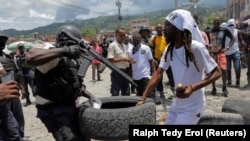In Haiti, political advancements are tempered by deteriorating security and humanitarian crises, according to the United Nations.
On December 21, Prime Minister Ariel Henry and representatives of numerous sectors of Haitian society signed a new political accord, the “National consensus for an inclusive transition and transparent elections” Agreement, which outlines plans for elections and the seating of Haiti’s “first post-reform government.”
“We are encouraged that a broad spectrum of political actors, the private sector, civil society groups, religious groups, trade associations, and others were able to come together to agree on the necessary steps for Haiti to move towards free and fair elections,” said U.S. Alternate Representative for Special Political Affairs Robert Wood. “The adoption of the December 21 accord is an opportunity for Haitians to get back to restoring their country’s stability and improving governance. It is vital that the political accord and its implementation remain inclusive, and we value the role civil society and the private sector have played in helping bring disparate parties together.”
However, in order to make progress, Haiti must address a number of serious problems, particularly the country’s humanitarian crisis and cholera epidemic, as well as its alarming levels of gang violence.
“Gang-related violence has reached unprecedented levels, which has only exacerbated the ongoing humanitarian crisis and hampered the ability to address the cholera outbreak, which has disproportionately impacted children and youth,” said Ambassador Wood.
The U.S. Government is providing hundreds of millions of dollars in foreign assistance to support efforts by the Haitian government and non-governmental organizations to address these challenges. To help address the rising levels of gang violence, the State Department has tripled its assistance to the Haitian National Police to $90 million since 2021. In addition, USAID is providing an additional 56.5 million dollars for humanitarian assistance.
U.S. foreign assistance is only part of the story. Sanctions also play an important supporting role. “We are encouraged that the establishment of a sanctions regime by the [UN] Security Council has deterred those who would carry out and finance the violence causing Haiti’s instability,” said Ambassador Wood.
Haiti is a priority partner in implementing the U.S. Strategy to Prevent Conflict and Promote Stability. “The United States continues to work to address Haiti’s humanitarian crisis, as well as its insecurity and to support Haitian-led efforts to facilitate the political conditions that would lead to free and fair elections.”














